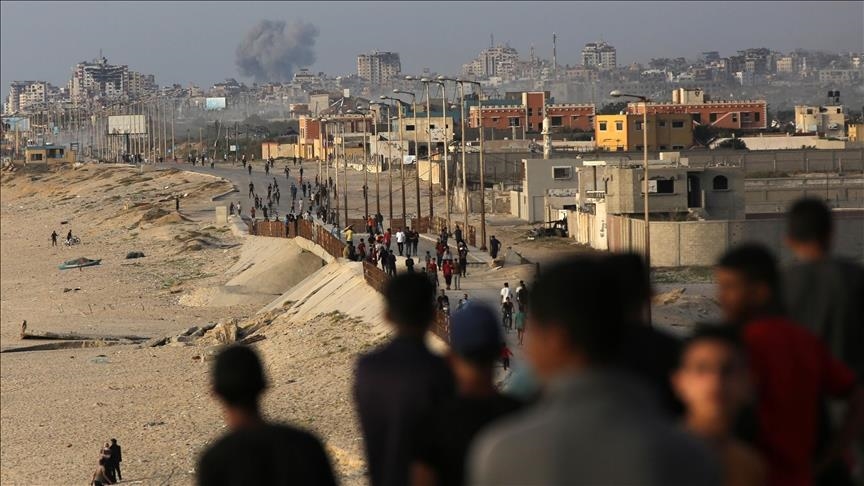All parties showing ‘genuine desire’ for Gaza cease-fire deal in Doha talks: Egyptian source
First day of discussions focuses on unresolved issues, implementation mechanisms for potential cease-fire in Gaza, Egyptian media cites high-profile source as saying

CAIRO
There is a “genuine desire” from all parties involved in the latest round of cease-fire talks hosted by Qatar to reach a cease-fire agreement in Gaza, an Egyptian source said late Thursday.
The comments were reported by Cairo News Channel, citing a “high-level” source at the conclusion of the first day of cease-fire negotiations in the capital Doha.
The source noted that the “first day of the talks on Gaza involved discussions on all unresolved points and mechanisms for implementing the agreement.”
“The first day of cease-fire discussions extended for more than seven hours, during which all parties expressed a genuine desire to reach an agreement,” the source added.
He said “the second day of the talks will continue discussions on the mechanisms for implementing the agreement.”
The source also emphasized that “the Egyptian security delegation reaffirmed during the talks Egypt’s commitment to swiftly reaching an agreement to end the ongoing war in the region and secure the release of prisoners and detainees.”
Negotiations to secure a cease-fire in the Gaza Strip and facilitate a prisoner exchange between Israel and the Palestinian group Hamas resumed Thursday in Qatar.
Israel's Haaretz daily reported that a source involved in the talks told the newspaper that “the talks went well” and the negotiations are “expected to renew” on Friday “and we are hoping to see progress in the next 48 hours.”
Qatar also said the talks will continue on Friday, emphasizing that the mediators are determined to persist in their efforts until a cease-fire agreement is reached.
The statement came from Qatari Foreign Ministry spokesperson Majed Al-Ansari and was published by the official local news agency, marking the end of the first day of the negotiations.
The talks, mediated by Qatar, Egypt and the US, bring together high-level representatives, including the heads of US and Egyptian intelligence and Israeli officials led by Mossad Chief David Barnea.
Hamas said Wednesday, however, that it will join the cease-fire and hostage swap talks if it gets a clear commitment from Israel on the implementation of a proposal backed by US President Joe Biden.
Biden said in May that Israel presented a three-phase deal that would end hostilities in Gaza and secure the release of hostages held in the coastal enclave. The plan includes a cease-fire, a hostage-prisoner exchange and the reconstruction of Gaza.
Typically, communication with Hamas occurs through Egyptian and Qatari mediators who relay messages between the group and Israel during indirect negotiations.
Hamas is insisting on ending the war in Gaza, the withdrawal of Israeli forces and the return of displaced Palestinians to their homes as part of any prisoner exchange deal.
Based on recent statements from Israeli Prime Minister Benjamin Netanyahu's office, however, four main issues need to be resolved to finalize an agreement.
Netanyahu’s office emphasized the need Tuesday for a mechanism to prevent armed Palestinians from crossing the Netzarim Corridor from central Gaza to the north.
Israeli negotiators have told reporters in recent weeks that the condition to establish a mechanism for screening Palestinians complicates reaching a deal.
Netanyahu's second condition is for Israel to maintain control over the Philadelphi Corridor (Salah al-Din axis) and the Rafah border crossing between Gaza and Egypt, which has been under Israeli control since May.
The third condition concerns knowing the number of Israeli prisoners still alive in Gaza, who would be exchanged for Palestinian prisoners held in Israeli jails.
Israel holds at least 9,500 Palestinians in its prisons, while Hamas claims there are around 115 Israeli prisoners in Gaza, with more than 70 reportedly killed in Israeli airstrikes.
The proposed agreement would involve the release of a limited number of “alive or dead” Israelis, but Netanyahu insists on the release of mostly living captives and wants Israel to receive a list of names in advance.
The fourth condition is for Israel to retain the right to reject the release of specific Palestinian prisoners that Hamas wants freed and to deport released prisoners outside of Palestine -- a condition Hamas rejects.
Israel, flouting a UN Security Council resolution demanding an immediate cease-fire, has faced international condemnation amid its continued brutal offensive on Gaza since an Oct. 7 attack last year by the Palestinian resistance group Hamas.
The Israeli onslaught has since killed more than 40,000 people, mostly women and children, and injured over 92,400, according to local health authorities.
More than 10 months into the Israeli onslaught, vast tracts of Gaza lie in ruins amid a crippling blockade of food, clean water and medicine.
Israel is accused of genocide at the International Court of Justice (ICJ), which ordered it to immediately halt its military operation in the southern city of Rafah, where more than a million Palestinians had sought refuge from the war before it was invaded on May 6.
*Writing by Mohammad Sio
Anadolu Agency website contains only a portion of the news stories offered to subscribers in the AA News Broadcasting System (HAS), and in summarized form. Please contact us for subscription options.







